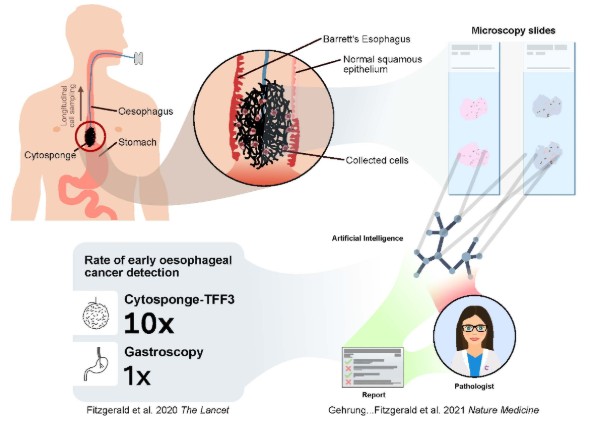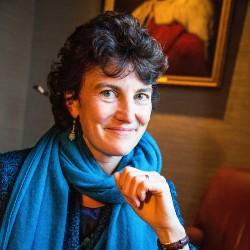Rebecca Fitzgerald holds the following roles:
- Professor of Cancer Prevention, University of Cambridge
- Director, Early Cancer Institute
- Lead for Cambridge Member Centre of the CRUK Alliance for Cancer Early Detection (ACED)
- NIHR Senior Investigator
- Lead for Cambridge BRC Devices and Advanced Therapies Theme
- Honorary Consultant in Gastroenterology, Cambridge University Hospitals
- Director of Studies in Medicine & Fellow in Medical Sciences, Trinity College, Cambridge
Biography
Rebecca Fitzgerald is Professor of Cancer Prevention at the University of Cambridge and Director, Early Cancer Institute.
She still practices medicine as an Honorary Consultant in Gastroenterology at Addenbrooke's Hospital, Cambridge.
She still practices medicine as an Honorary Consultant in Gastroenterology at Addenbrooke's Hospital, Cambridge.
She studied Medicine at Cambridge University and gained her MD in 1997 following a period of research at Stanford University, California, with Professor George Triadafilopoulos. Her postdoctoral training took place at the Department of Adult and Paediatric Gastroenterology, St Barts and The Royal London School of Medicine and Dentistry with Professor Michael Farthing, funded by an MRC Clinician Scientist award. She returned to Cambridge in 2001.
The focus of her research group is to improve methods for early detection of oesophageal cancer through better understanding of the molecular pathogenesis. Rebecca was awarded the prestigious Westminster medal and prize for her first proof-of-concept work on the CytospongeTM and associated assays for diagnosing Barrett’s oesophagus in 2004. Since then this work has received an NHS Innovation prize (2011) and the BMJ Gastro team of the year award (2016). She received a Lister Prize Fellowship in 2008 and in 2013 was awarded an NIHR Research Professorship to facilitate translational research for patient benefit. She was elected a Fellow of the Academy of Medical Sciences in 2013. In 2018 she received the Jane Wardle Prevention and Early Diagnosis Prize, and in 2021 the Don Listwin Award for Outstanding Contribution to Cancer Early Detection.
Rebecca has a plethora of teaching experience and is a Member of the Institute of Learning and Teaching. She is Director of Medical Studies for Trinity College Cambridge, where she is involved with undergraduate and clinical teaching. She has a wealth of lecturing experience including radio broadcasts for BBC Radio 4 and ABC Radio Australia, Health of the Nation. Rebecca is committed to bringing research advances into clinical practice and inspiring other researchers to do likewise.
Research
The Fitzgerald Group is passionate about finding innovative ways to detect cancer at an early stage. We particularly focus on oesophageal and gastric cancer which together account for a substantial cancer burden worldwide. Oesophageal cancer is one of the most deadly cancers with a 5 year survival of under 20%. In order to develop new solutions for diagnosing individuals at high risk for oesophageal and gastric cancer we are a highly inter-disciplinary group spanning: epidemiology and public health; cell and molecular biology; computational biology; clinical trial expertise; and collaborative work in machine learning, physics and chemical engineering.
Our main research aims are to:
- Understand the underlying clinical, genetic and cell environmental factors that lead to the conversion of a low-risk pre-malignant state into invasive cancer.
- Develop and evaluate new diagnostic tools that will identify those patients who are at an increased risk of developing cancer.
- Improve the molecular characterisation of oesophago-gastric cancer to inform patient management.
Key areas of interest:
- CRUK Cambridge Centre research programme(s): Early Detection
- Tumour type/site: Oesophago-gastric
- Methods & technologies: Multi-omics and integration with clinical data, single cell sequencing, patient derived organoids, machine learning, devices, biomarkers
We have a pragmatic approach to research which comes from a working knowledge of the clinical disease with the aim of translating our research findings into clinical practice. Our most notable success has been in developing the Cytosponge-biomarker technology all the way from concept through to large scale clinical trial and implementation.
- https://cambridgebrc.nihr.ac.uk/the-cytosponge/
- https://www.nice.org.uk/advice/mib240/chapter/The-technology
- https://news.cancerresearchuk.org/2020/07/31/a-sponge-on-a-string-test-to-detect-oesophageal-cancer-earlier/
Open/ongoing Clinical Trials
Publications
- Use of a Cytosponge biomarker panel to prioritise endoscopic Barrett’s oesophagus surveillance: a crosssectional study followed by a real-world prospective pilot. Pilonis ND, Killcoyne S, Tan WK, O’Donovan M, Malhotra S, Tripathi M, Miremadi A, Debiram-Beecham I, Evans T, Phillips R, Morris DL, Vickery C, Harrison J, di Pietro M, Ortiz-Fernandez-Sordo J, Haidry R, Kerridge A, Sasieni PD, Fitzgerald RC. Lancet Oncology 2022 Epub ahead of print. DOI: 10.1016/S1470-2045(21)00667-7. Supporting data: Individual patient-level data are available for the retrospective cohorts in the BEST2 and BEST3 trials upon request. Patient-level data included in the DELTA prospective trial will be available on completion of the trial in April, 2023. Trial protocols are available via the University of Cambridge data repository at https://www.data.cam.ac.uk/repository.
- Molecular phenotyping reveals the identity of Barrett’s esophagus and its malignant transition. Nowicki-Osuch K, Zhuang J, Jammula S, Vleaney CW, Mahbubani KT, Devonshire G, Katz-Summercorn A, Eliing N, Wilbrey-Clark A, Madissoon E, Gamble J, Di Pietro M, O’Dononvan M, Meyer KB, Saeb-Parsey K. Sharrocks A, Teichmann SA, Marioni JC, Fitzgerald RC. Science 2021 373; 760-767 DOI:10.1126/SCIENCE.ABD1449
- Triage-driven diagnosis of Barrett’s esophagus for early detection of esophageal adenocarcinoma using deep learning. Gehrung M, Crispin-Ortuzar M, Berman AG, O’Donovan M, Fitzgerald RC, Markowetz F. Nat Med 2021 May;27(5):833-841. doi: 10.1038/s41591-021-01287-9. Supporting data: The dataset is governed by data usage policies specified by the data controller (University of Cambridge, Cancer Research UK). We are committed to complying with Cancer Research UK’s Data Sharing and Preservation Policy. Whole-slide images used in this study will be available for non-commercial research purposes upon approval by a Data Access Committee according to institutional requirements. Applications for data access should be directed to rcf29@cam.ac.uk. Data derived from the raw images are freely available at a public repository: https://github.com/markowetzlab/cytosponge-triage. The code and included data enable replication of the results and figures in this manuscript.
- Genomic copy number predicts esophageal cancer years before transformation. Killcoyne S, Gregson E, Wedge DC, Woodcock DJ, Eldridge MD, de la Rue R, Miremadi A, Abbas S, Blasko A, Kosmidou C, Januszewicz W, Jenkins AV, Gerstung M, Fitzgerald RC. Nat Med. 2020 Sep 7. doi: 10.1038/s41591-020-1033-y. PMID: 32895572. Supporting data: Sequencing data and associated metadata that support the present study have been deposited in the European Genome-phenome Archive under accession number EGAD00001006033. The code and model that support these findings have been provided as an R package in a GitHub repository (https://github.com/gerstung-lab/BarrettsProgressionRisk). Source data are provided with this paper.
- Cytosponge-trefoil factor 3 versus usual care to identify Barrett’s oesophagus in a primary care setting: a prospective, multicentre, pragmatic, randomised controlled trial. Fitzgerald RC, di Pietro M, O’Donovan M, Maroni R, Muldrew B, Debiram-Beecham I, Gehrung M, Offman J, Tripathi M, Smith SG, Aigret B, Walter FM, Rubin G, on behalf of the BEST3 Trial team, Sasieni P. The Lancet 2020 Aug;396(10247):333-344. doi: 10.1016/S0140-6736(20)31099-0. Supporting data: Aggregated data are available for the usual care group and the intervention group, and individual patient-level data are available for patients who consented to the Cytosponge-TFF3 intervention. The trial protocol, statistical analysis plan, and statistical report will be available via the University of Cambridge data repository (https://www.data.cam.ac.uk/repository).
- Identification of Subtypes of Barrett's Esophagus and Esophageal Adenocarcinoma Based on DNA Methylation Profiles and Integration of Transcriptome and Genome Data. Jammula S, Katz-Summercorn AC, Li X, Linossi C, Smyth E, Killcoyne S, Biasci D, Subash VV, Abbas S, Blasko A, Devonshire G, Grantham A, Wronowski F, O'Donovan M, Grehan N, Eldridge MD, Tavaré S; Oesophageal Cancer Clinical and Molecular Stratification (OCCAMS) consortium, Fitzgerald RC. Gastroenterology, 2020 May;158(6):1682-1697.e1 doi: 10.1053/j.gastro.2020.01.044.
- Genomic copy number predicts esophageal cancer years before transformation. Killcoyne S, Gregson E, Wedge DC, Woodcock DJ, Eldridge M, de la Rue R, Miremadi A, Abbas S, Blasko A, Kosmidou C, Januszewicz W, Jenkins AV, Gerstung M, Fitzgerald RC. Nature Medicine 2020 Sep, doi: 10.1038/s41591-020-1033-y. Supporting data: Sequencing data and associated metadata that support the present study have been deposited in the European Genome-phenome Archive under accession number EGAD00001006033. The code and model that support these findings have been provided as an R package in a GitHub repository (https://github.com/gerstung-lab/BarrettsProgressionRisk). Source data are provided with this paper.
- Organoid cultures recapitulate esophageal adenocarcinoma heterogeneity providing a model for clonality studies and precision therapeutics. Li X, Francies HE, Secrier M, Perner J, Miremadi A, Galeano-Dalmau N, Barendt WJ, Letchford L, Leyden GM, Goffin EK, … Fitzgerald RC. Nat Commun. 2018 Jul;9(1):298330 doi: 10.1038/s41467-018-05190-9. Supporting data: The RNA and whole-genome DNA sequencing data are available at the European Genome-phenome Archive (EGA) under accession EGAD00001004007. Information to match the sample identifier to the patients and organoids is provided in Supplementary Table 3.
- The landscape of selection in 551 Esophageal Adenocarcinomas defines genomic biomarkers for the clinic. Frankell AM, Jammula S, Contino G, Killcoyne S, Abbas S, Perner J , Bower L , Devonshire G, Grehan N, Mok J, O’Donovan M, MacRae S , Tavare S, Fitzgerald RC and the Oesophageal Cancer Clinical and Molecular Stratification (OCCAMS) Consortium. Nature Genetics 2019 Mar;51(3):506-516. doi: 10.1038/s41588-018-0331-5. Supporting data: The WGS and RNA expression data can be found at the European Genome-phenome Archive under accession numbers EGAD00001004417 and EGAD00001004423, respectively.
- Risk stratification of Barrett's oesophagus using a non-endoscopic sampling method coupled with a biomarker panel: a cohort study. Ross-Innes CS, Chettouh H, Achilleos A, Galeano-Dalmau N, Debiram-Beecham I, MacRae S, Fessas P, Walker E, Varghese S, Evan T, Lao-Sirieix P, O’Donovan M, Malhotra S, Novelli M, Disep B, Kaye PV, Lovat LB, Haidry R, Griffin M, Ragunath K, Bhandari P, Haycock A, Morris D, Attwood S, Dhar A, Rees C, Rutter MD, Ostler R, Aigret B, Sasieni PD, Fitzgerald RC. The Lancet Gastroenterology and Hepatology. 2017;2(1), 23-31. doi:10.1016/S2468-1253(16)30118-2.
- Mutational signatures in esophageal adenocarcinoma define etiologically distinct subgroups with therapeutic relevance. Secrier M, Li X, de Silva N, Eldridge MD, Contino G, Bornschein J, MacRae S, Grehan N, O'Donovan M, Miremadi A, Yang TP, Bower L, Chettouh H, Crawte J, Galeano-Dalmau N, Grabowska A, Saunders J, Underwood T, Waddell N, Barbour AP, Nutzinger B, Achilleos A, Edwards PA, Lynch AG, Tavaré S, Fitzgerald RC; Oesophageal Cancer Clinical and Molecular Stratification (OCCAMS) Consortium. . Nat Genet. 2016 Oct;48(10):1131-41. doi: 10.1038/ng.3659.
- Whole-genome sequencing provides new insights into the clonal architecture of Barrett’s esophagus and esophageal adenocarcinoma. Ross-Innes CS, Becq J, Warren A, Cheetham RK, Northen H, O’Donovan M, Malhotra S, di Pietrol M, Ivakhno S, He M, Weaver JM, Lynch AG, Kingsbury Z, Ross M, Humphray S, Bentley D, Fitzgerald RC, on behalf of the Oesophageal Cancer Clinical and Molecular Stratification (OCCAMS) study Group. Nat Genet 2015 Sep 47(9) 1038-46 Epub 2015 Jul 20
Google Scholar: https://scholar.google.com/citations?hl=en&user=71qFwcIAAAAJ
Teaching and Supervisions
- Clinical Research Training Fellows
- PhD Students
- Masters Students
- Visiting Students
Other Professional Activities
Committees:
- Chair of Internal Affairs and Member of the Executive Board for the Association of Physicians
- Past Chair and member of International ACED Alliance Board
- Member of Wellcome Trust Cinical Fellowships Committee
- Scientific Advisory Board to Addenbrooke's Charitable Trust
Editorships:
- Senior Associate Editor: 'Gastroenterology' (American Gastroenterological Association) premier specialist GI journal since 2017 with term recently extended (Handlde >340 original manuscripts)
- Editor: Gastoenterology section for F1000
Publishing Board Positions:
- Expert Advisory Board: Nature REviews Gastroenterology & Hepatology
- Editorial Board member: Expert Reviews in Molecular Medicine, Gut
- Oesophageal Section: Oxford Textbook of Medicine
Scientific Advisory Board Positions:
- The Beatson Institute, Glasgow
- Centre de Recherche des Cordeliers, Paris
- Precision Oncology, Ireland
- Bavarian Cancer Research Centre
Trustee Positions:
- Trustee and Director of the Evelyn Trust
- Member of the Lister Institute Governing Body
- Trustee Heartburn Cancer UK
- Trustee and Director of the Faraday Institute


